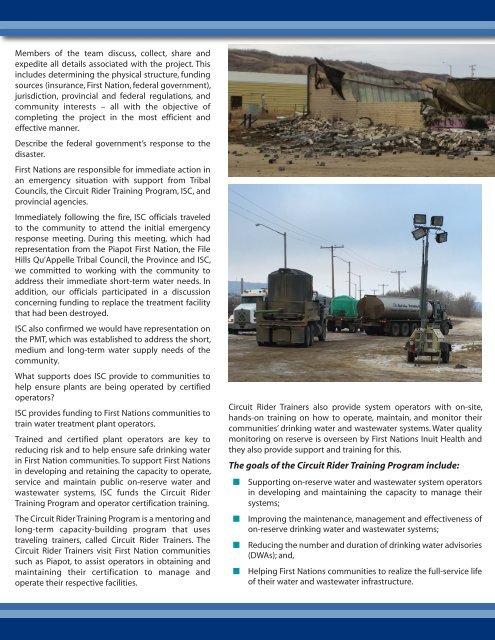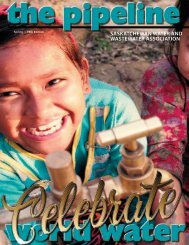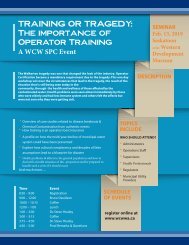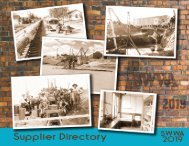2018WinterPipeline2
You also want an ePaper? Increase the reach of your titles
YUMPU automatically turns print PDFs into web optimized ePapers that Google loves.
Members of the team discuss, collect, share and<br />
expedite all details associated with the project. This<br />
includes determining the physical structure, funding<br />
sources (insurance, First Nation, federal government),<br />
jurisdiction, provincial and federal regulations, and<br />
community interests – all with the objective of<br />
completing the project in the most efficient and<br />
effective manner.<br />
Describe the federal government’s response to the<br />
disaster.<br />
First Nations are responsible for immediate action in<br />
an emergency situation with support from Tribal<br />
Councils, the Circuit Rider Training Program, ISC, and<br />
provincial agencies.<br />
Immediately following the fire, ISC officials traveled<br />
to the community to attend the initial emergency<br />
response meeting. During this meeting, which had<br />
representation from the Piapot First Nation, the File<br />
Hills Qu’Appelle Tribal Council, the Province and ISC,<br />
we committed to working with the community to<br />
address their immediate short-term water needs. In<br />
addition, our officials participated in a discussion<br />
concerning funding to replace the treatment facility<br />
that had been destroyed.<br />
ISC also confirmed we would have representation on<br />
the PMT, which was established to address the short,<br />
medium and long-term water supply needs of the<br />
community.<br />
What supports does ISC provide to communities to<br />
help ensure plants are being operated by certified<br />
operators?<br />
ISC provides funding to First Nations communities to<br />
train water treatment plant operators.<br />
Trained and certified plant operators are key to<br />
reducing risk and to help ensure safe drinking water<br />
in First Nation communities. To support First Nations<br />
in developing and retaining the capacity to operate,<br />
service and maintain public on-reserve water and<br />
wastewater systems, ISC funds the Circuit Rider<br />
Training Program and operator certification training.<br />
The Circuit Rider Training Program is a mentoring and<br />
long-term capacity-building program that uses<br />
traveling trainers, called Circuit Rider Trainers. The<br />
Circuit Rider Trainers visit First Nation communities<br />
such as Piapot, to assist operators in obtaining and<br />
maintaining their certification to manage and<br />
operate their respective facilities.<br />
Circuit Rider Trainers also provide system operators with on-site,<br />
hands-on training on how to operate, maintain, and monitor their<br />
communities’ drinking water and wastewater systems. Water quality<br />
monitoring on reserve is overseen by First Nations Inuit Health and<br />
they also provide support and training for this.<br />
The goals of the Circuit Rider Training Program include:<br />
n<br />
n<br />
n<br />
n<br />
Supporting on-reserve water and wastewater system operators<br />
in developing and maintaining the capacity to manage their<br />
systems;<br />
Improving the maintenance, management and effectiveness of<br />
on-reserve drinking water and wastewater systems;<br />
Reducing the number and duration of drinking water advisories<br />
(DWAs); and,<br />
Helping First Nations communities to realize the full-service life<br />
of their water and wastewater infrastructure.<br />
Has it been determined when the new plant will be completed,<br />
operational and commissioned to the First Nation?<br />
No. As the PMT is only in the feasibility and pre-design stage, we cannot<br />
confirm a date as to when the new plant will be completed and ready for<br />
operation. From start to finish, the process to plan, tender, build and<br />
commission a water treatment plant usually takes approx. 2 years.<br />
As noted by INAC and stated by Don Poon in the phone interview the<br />
process for building a new plant takes time as does approval. We will be<br />
watching and following up in the New year with the steps being taken to<br />
get a good working solution in place while the new plant is being<br />
approved and built.<br />
It is not always easy to work through and handle an incident like this one<br />
but a few huge things to note happened during this crisis:<br />
1<br />
A community pulled together, remained optimistic and was<br />
helpful ensuring the fire did not spread and that the grass fire<br />
was controlled<br />
2<br />
3<br />
The Piapot<br />
Water was restored to the school within 24 hours of the fire<br />
ensuring class time of only one day was missed<br />
The operators of the Piapot First Nation worked hard with the<br />
project managers brought in (Don Poon and Lawrence Lukey)<br />
to find a solution that would work for the time being.<br />
community<br />
has banded<br />
together and<br />
remains<br />
positive
















